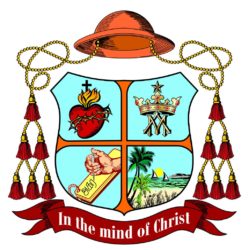Bishop’s Message
Dear Fathers, Sisters and Brothers,
Greetings!
On the solemnity of Ss. Peter and Paul last month, I happily completed seven years of my life as the bishop of Kottar. As I look back the way I have trod, at this juncture, a sense of gratitude fills my heart as I think of God who guided me at the time of perplexities and guarded me at the time of great difficulties. In the same way, I also render my sincere thanks to each and everyone of you for your brotherly presence and priestly solidarity. To all people who bear me close in their prayers and those who accompany me at the time of need, I owe them much. While assuring you of my simple prayers, as a humble servant of the Lord, I earnestly solicit your continual cooperation and unstinting support in the years to come so that we, as sisters and brothers, may walk and work together for the bright future of our diocese.
Except three parishes (to be done soon), I have fulfilled the canonical obligation of the pastoral visit to all other parishes along with their substations of our dioceses. My profound thanks go to the Vicars Forane who, with commendable commitment, have been benignly facilitating the pastoral visits. These visits have greatly helped me know personally the overall life situation of our people and have genuinely helped me learn a great lot from their deep faith and unadorned spirituality. At the same time, it provided an ample space for me to appreciate our priests and people for their relentless service to the parishes and to suggest some pertinent proposals for the holistic growth of the parishes. Invariably in all the parishes, among other recommendations, I always insisted upon two things. The first is that each parish designs a well-strategized pastoral plan involving all the participatory structures and an annual surplus budget for the parish. Secondly, each parish should be convinced of our diocesan priority of allocating 10% of the annual income for the welfare of the poor (“For you always have the poor with you” Mk 14:7) and 5% for ongoing formation and trainings of the parishioners. It is appreciable that a considerable number of parishes, in fact, have some fixed deposits meant for the poor and the marginalized and some others try to create a corpus for this purpose. There are a few other parishes which strive hard to allot a minimum percentage in their annual budget. However, there are still some others spending extravagantly for the annual feast but turning a blind eye to the poor in their parishes. It is my fervid exhortation that, taking the diocesan priority seriously, all the parishes of our diocese consciously apportion 10% of the annual income for the noble cause of the poor in the parishes.
The month of July reminds us of one such poor among us i.e., the Grandparents and the Elderly in our parishes and communities. Pope Francis has chosen the theme “Do not cast me off in my old age”
(Ps 71:9) for the IV World Day for Grandparents and the Elderly to be celebrated on July 28, Sunday. Reflecting on the theme, in his message, the Holy Father invites us to heed to the plea of the elderly persons who endure loneliness which “is the bleak companion of the lives of elderly persons and grandparents.” He reassures that “God never abandons His children, never” and refers to the elderly as “the firm foundation” on which “new” stones can rest to join in erecting a spiritual edifice (cf. 1Pet 2:5). Citing the story of Naomi from the Book of Ruth, the Holy Father exhorts us to see Ruth, not abandoning the lonely and elderly Naomi, as the model for today’s families as she “does not leave Naomi’s side and, to her surprise, tells her: “Do not press me to leave you” (Ruth 1:16). He concludes his message with an appeal: “In place of the self-centred attitude that leads to loneliness and abandonment, let us instead show the open heart and the joyful face of men and women who have the courage to say ‘I will not abandon you’, and to set out a different path.”
Let us not forget to celebrate this particular day in our parishes as a day to acknowledge and appreciate the gracious presence of the grandparents and the elderly in our parishes and the positive contribution they have made.
